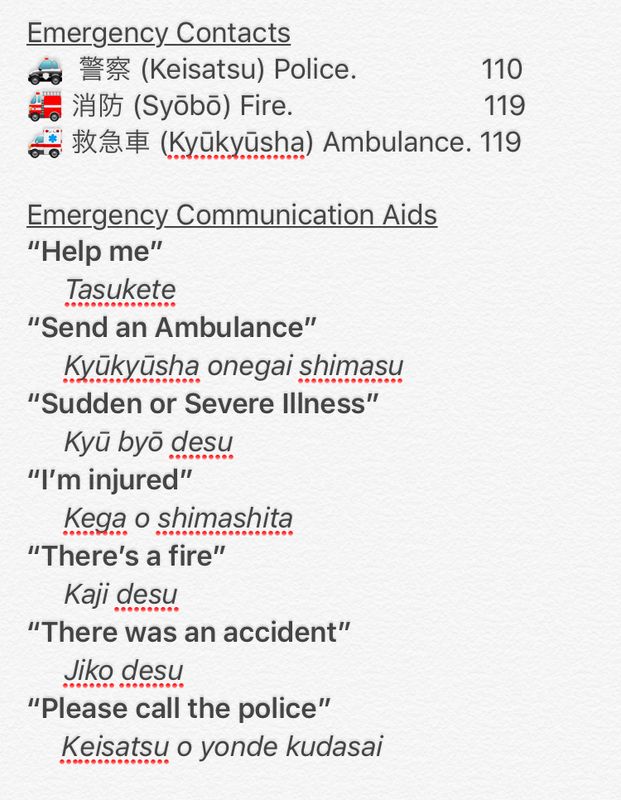Jan 15, 2018
Emergency Japanese: Some necessary Words/Phrases That You'll Hopefully Never Need
Nobody ever wants to find themselves in an emergency, and most travelers do not expect to have to engage emergency services along their journeys. Still, bad things can happen, even in a country as safe and secure as Japan. For that reason, I wanted to offer a few words and phrases that will help you through those emergent situations, along with this handy little picture that you can screenshot or download to use as a emergency flashcard should the need arise (hopefully not).

In Japan, there are two numbers for emergency services: 110 and 119 (and yes, you're reading that right--that is just the reverse of 911).
110 will get you the police and should be used in the event of a crime (theft, assault, etc.) or accident (that does not include major injuries).
119 is for the Fire Department and Emergency Medical Services, so you should use that if you or a travel companion needs an ambulance, there has been an accident with major injuries, or there is a fire.
Some key words and phrases include the following:
"Help Me"
Tasukete
"Send an Ambulance"
Kyukyusha onegai shimasu
"Sudden or Severe Illness"
Kyu bo desu
"I'm injured"
Kega o shimashita
"There's a fire"
Kaji desu
"There was an accident"
Jiko desu
"Please call the police"
Keisatsu o yonde kudasai
Here are a couple notes on how to respond to emergencies in Japan:
- All throughout Japan, there are "Police Boxes" called Koban--basically just tiny police stations scattered throughout cities and towns. They will almost always have an attending officer who can help you respond to any emergency. If an officer is not present, there will be a direct line phone inside that will dial to the nearest police station if you just pick it up.
- Many taxis in Japan have additional roles as emergency response vehicles in preparation for a major natural disaster. If you or your travel companion need emergency assistance and you don't have a phone that works in Japan or police box nearby, you may consider hailing a taxi and either having them rush you to a hospital or call for the nearest emergency service vehicles.
Finally, not all travel emergencies are major and involve the police or fire department. Sometimes a travel emergency may just include losing something important. Fortunately, people in Japan are famous either for leaving items alone or turning them into lost and found, so you'll more than likely be able to recover anything. If you lost something on a train, just go to the nearest train attendant and tell them what you lost. The same goes for an airport. If you lost something out on the streets, head to the nearest police box (koban) and give them the details.
In all cases, the attendant will ask for a description of what was lost and for contact information for them to reach you. They will call you to come retrieve the item(s) once found.
Here are some common words/phrases for things that travelers lose along the way:
Wallet - saifu
Ticket - kippu
Luggage/Bags - nimotsu
Mobile phone - keitai denwa or simply, keitai
Passport - pasupoto
"I lost ____."
______ o naku shimashita
I truly hope you won't need to use any of these words or phrases outlined here, but if you find yourself in a pinch, I hope this post helps get you out of it.
Do you have any questions or maybe some other helpful tips for emergency communication in Japan? Feel free to use the comments section below!
Hitting the books once again as a Ph.D. student in Niigata Prefecture. Although I've lived in Japan many years, life as a student in this country is a first.
Blessed Dad. Lucky Husband. Happy Gaijin (most of the time).



0 Comments